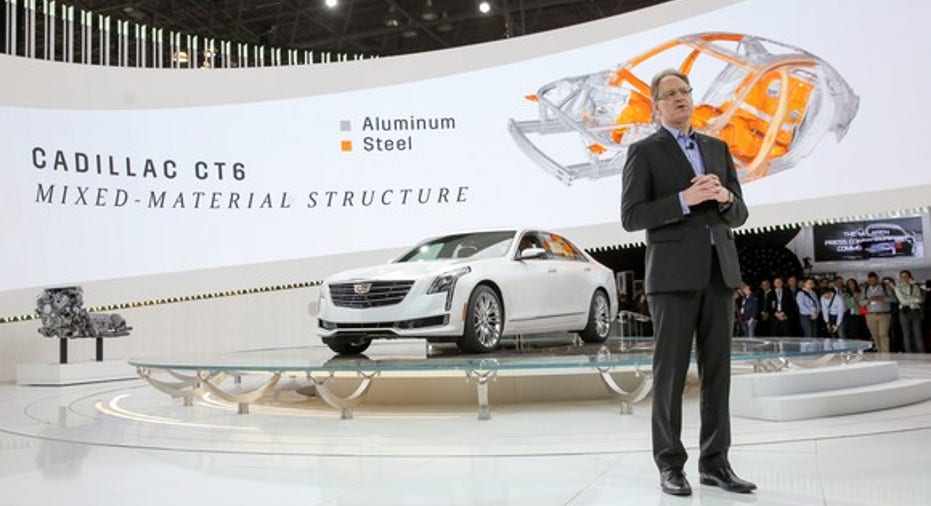Will Cadillac Dealers Complicate General Motors' Plan to Boost Profits?

Cadillac president Johan de Nysschen with a CT6 sedan in New York last year.Cadillac's U.S. dealers are unhappy with de Nysschen's plan to reorganize them, and some have taken the issue to his boss, CEO Mary Barra. Image source: General Motors.
The U.S.'s largest state association of new-car dealers is pushing General Motors (NYSE: GM) to delay or change an aggressive plan to restructure its Cadillac dealer network, according to a new report in trade publication Automotive News.
To GM investors, that may seem like auto-industry inside baseball. But what GM is trying to do with Cadillac is an important part of a plan to increase its profitability, and this is a potential wrench in the works.
What's happening?
The California New Car Dealers Association has written a letter to GM CEO Mary Barra, saying that it has heard from 52 Cadillac dealers who have "serious reservations" about a plan to divide Cadillac's 925 U.S. dealers into five tiers.
The letter to Barra follows efforts by dealer groups in other states to push Cadillac president Johan de Nysschen to delay or change the program. For many current Cadillac dealers, the plan would mean radical changes that they fear will hurt their sales and profitability.
What's the plan?
Cadillac president Johan de Nysschen says that the plan, called Project Pinnacle, is his way of making the most of Cadillac's large dealer network.
GM's luxury brand has far more U.S. dealerships than its German-brand rivals, something that has long been seen as a disadvantage. More dealerships mean fewer sales per store, meaning that each store is less profitable. That in turn means that the dealers are less motivated to reinvest in their businesses.
The result is that many feel that Cadillac dealers don't deliver the same level of service or polish that other, more profitable luxury-car dealers can.
Because it would be politically very difficult (and very expensive) for GM to close half or more of its U.S. Cadillac dealers, de Nysschen came up with a plan to turn the large number of dealerships to Cadillac's advantage.
Project Pinnacle divides the dealers into 5 tiers based on their projected annual sales. Each tier gets a scaled level of service standards and incentives for hitting various targets. Stores in the very lowest tier would have no inventory of new Cadillacs at all. Instead, they would provide service while hosting a "virtual showroom" to make sales.
The goal of the plan is to significantly upgrade the level of attention and service provided to Cadillac customers, while making sure that even small dealers can provide that attention and service profitably. That's an important component of the larger plan to upgrade Cadillac's brand image, which in turn is a key part of Barra's plan to boost GM's globalprofitability over the next few years.
Why are the dealers upset with it?
Dealer groups say that Project Pinnacle would give a lot of benefits to large stores that happen to be in locations deemed desirable, leaving smaller Cadillac dealers at a disadvantage -- and at risk of being put out of business entirely. The plan would require significant (read: expensive) changes to many dealers' facilities and delay payments of important incentives, they say.
De Nysschen disagrees. He has said repeatedly that the program makes it easier for smaller dealerships to meet Cadillac's standards and generate more profit. He has emphasized that the program was developed jointly with Cadillac's national dealer council, in close consultation with key dealerships.
De Nysschen insists that Project Pinnacle is about using Cadillac's big dealer network to best advantage. But a National Automobile Dealers Association survey of Cadillac dealerships found that 87% of them think that Project Pinnacle's real purpose is to eliminate many of Cadillac's smaller dealerships.
What's likely to happen here?
Project Pinnacle had been scheduled to begin on Oct. 1, but the company has delayed it until Jan. 1, 2017, because of dealer feedback.
But the dispute could get ugly before then. The California dealers' letter to Barra made a point of saying that Project Pinnacle violates at least eight California state laws. De Nysschen disagrees, describing Project Pinnacle as "legally bulletproof." It's possible that assertion could be tested in court before long.
A secret billion-dollar stock opportunity The world's biggest tech company forgot to show you something, but a few Wall Street analysts and the Fool didn't miss a beat: There's a small company that's powering their brand-new gadgets and the coming revolution in technology. And we think its stock price has nearly unlimited room to run for early in-the-know investors! To be one of them, just click here.
John Rosevear owns shares of General Motors. The Motley Fool recommends General Motors. Try any of our Foolish newsletter services free for 30 days. We Fools may not all hold the same opinions, but we all believe that considering a diverse range of insights makes us better investors. The Motley Fool has a disclosure policy.



















